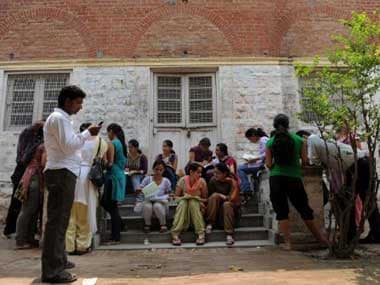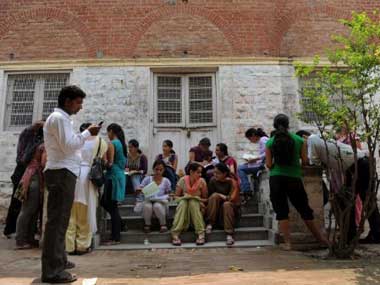By Debaditya Bhattacharya The UGC Directive to DU colleges to scrap the four-year undergraduate programme and continue undergraduate admissions for 2014-15 in the three-year format has injected a new lease of hope into a movement more than one-and-a-half years old. It may be a little early to dub this as a definitive moment of victory, because the DU-VC is still bulwarking every evidence of his misrule with his twin power-braces of ‘autonomy’ and ‘emergency’. The battle indeed is still to be fought and yet to be won. But some are dubbing the UGC’s recent turnaround as ‘Modi sarkaar ki maar’ while others see this as evidence of the much-doubted HRD minister’s test of competence. Though this isn’t a game of credit-hoarding, most however have agreed that a mere structural antagonism between the ruling party and a Vice-Chancellor appointed during the tenure of and cohorting with its political adversary has helped the struggle. [caption id=“attachment_1550327” align=“alignleft” width=“380”]  Representational image. AFP[/caption] But what is inappropriate is to ignore the history of a struggle that has over time exceeded the interventions of direct stakeholders in the university/ministry and has increasingly evoked people’s concern and alarm over the fate of public-funded education in the country. The success of the anti-FYUP movement, I think, lies not solely in the circumstantial benefits of it in the generations of students graduating from DU but in having given ‘popular’ visibility to the relationship between public education and social justice. Credit therefore is due not to a month old government or its ‘performer’ ministers, but to the thousands of voices and hands that have gone up in the air and braved batons and police atrocities for more than a year and half. Also, much of this moment owes to the largely media-informed public which may not have participated in demonstrations and dharnas in front of the VC’s office, but has nevertheless expressed concern about the state of public universities in their everyday conversations or in newspaper columns. But this is still not the time for self-congratulation, but instead of intense caution. The chronicle of recent events might read like a conclusive drawing of curtains on the illegally imposed and ill-conceived FYUP, but –- if reports from individual colleges are to be believed –- the saga continues. Despite warnings of grant-discontinuation from the UGC, Shri Ram College of Commerce (SRCC) has gone ahead and published its first list of cut-offs, thus aiding and abetting the climate of confusion that already exists among current applicants. While 66 of the DU-affiliated colleges have decided to put the admission process on hold till there is a clear mandate from the university, sources from a few other colleges confirm that preparations are on for admissions under the FYUP scheme from 24 June. In the absence of any official notification directly from the university and in the context of the Vice-Chancellor’s obstinate disregard for any process of dialogue, principals of 36 colleges met yesterday to strike a posture of utter helplessness and to further the uncertainty that looms large over the fate of about 60,000 students seeking admission to various courses here. Given the stalemate, it is imperative that the lack of legal sanction for the current course be made the cause for the Visitor – the President of India – to step in and reject the Ordinance of the University relating to FYUP. That would put an end to all speculation and undue confusion, arising out of a battle of political interests at the Centre that this is increasingly being looked at as. This will grant a decisive victory to the interests of students and teachers at large over neoliberal assaults on education. While evidently victory is not too far, there are a few lessons that we need to take home from this protracted battle against an anti-student anti-teacher spate of academic ‘reforms’ in university education. The first of course is the lesson of solidarity. At a time when institutional spaces are increasingly becoming hostile to all forms of debate and dissent, it is we – students and teachers – who need to forge a unity towards the cause of social justice and our basic rights. In the face of increasing costs of education through unashamed efforts at privatisation, a public university’s decision to add a fourth year to undergraduate study tantamounts to an enormous additional cost burden (to the tune of at least 1.5 lakh rupees for outstation students) on parents or guardians. Furthermore, the sham of multiple exit-options within the FYUP allowing for a Non-Honours Bachelor’s degree at the end of the third year only insists that the right to education be made directly proportional to the spending power of the student. The VC seems to endorse the logic of private service-providers, wherein the value of your degree depends on the price that you pay for it. And in such a situation, if the UGC has suddenly woken up to discrepancies in the implementation of FYUP, it is not because the NDA government cares any more about the thousands of admission-seekers who are still groping in the dark. Neither is it because a non-graduate HRD Minister is more responsive to the trials and tribulations that mark the rite of passage into a graduation course. Rather, there is enough evidence to prove the contrary. The ruling party is only delivering on its election promise in Delhi, while simply attempting to undo the Congress one more time. It’s a battle of political one-upmanship for them, but for us it is a struggle for our rights that we have taken to the streets and fought determinedly over the darkest of days and years. The emergence of an independent progressive teacher-activism in the formation of platforms like Joint Action Body (JAB) has not only nuanced our struggles through focused debate, but has also enabled a space of solidarities and identifications outside of organized political formations. While the role of the DUTA in mobilising otherwise-noncoincident voices into a panoply of popular resentment has been particularly crucial, student bodies like AISA have sustained the movement with a rare commitment when all else seemed taken over by a lull. It is high time we realize that this movement is larger than any or all of these organizations taken together. It is a movement that demands togetherness beyond this one course or one model of undergraduate education. It belongs to a moment of consciousness-building about the fact that what we demand is every bit of what we deserve – affordable quality education in public institutions. The second lesson to take from this upsurge relates to the more than 4,000 ad hoc teachers working in Delhi University at present – and who are at best treated as a floating daily-wage workforce with no rights and entitlements. And, yet it is this infinitely substitutable labour-force that the university administration has used as a bait to legitimize the FYUP, by mythically relating the latter to an opening up of permanent appointments. It is a known that the FYUP (coupled with the semester-system) will not in the remotest way inflate workload, but will rather augment the plague of contractualization in DU through a non-uniform distribution of course content and fluctuating student-strengths owing to multiple exit-points. Ad hoc teachers have been lured into believing that an extra year means extra jobs, and the deviously orchestrated coincidence of FYUP with a ‘sudden’ opening up of posts after a three-year hiatus convinced them. Nothing is farther from the fact, because as per the VC’s own admittance, the posts being currently filled (as an eyewash to justify the FYUP as a pro-teacher reform) are in keeping with the number sanctioned after OBC reservations as “outer limit”. Knowing all of this, it is time the ad hoc fraternity decides on its allegiances and takes a responsible stand with regard to a programme that aims for permanent contractualization of teachers. This battle is as much theirs as of any other, and a sense of alienation from the larger goals of this movement is mostly misplaced. The final – and the most important – lesson is of course reserved for the Vice-Chancellor. It is sad that DU stands to witness such a massive blow to its ‘autonomy’. But this was just a necessary lesson for His Highness to not read ‘autocracy’ in ‘autonomy’. A public-funded university, despite its haloed autonomous stature, cannot be above the interests of the public. (Debaditya Bhattacharya researches on contemporary philosophy. He used to teach at Delhi University.)
The anti-FYUP movement’s success is in giving visibility to the relationship between public education and social justice. And the biggest lesson is that autonomy is not autocracy.
Advertisement
End of Article
Written by FP Archives
see more


)

)
)
)
)
)
)
)
)



